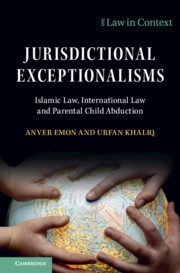Book contents
- Jurisdictional Exceptionalisms
- Law in Context Series
- Jurisdictional Exceptionalisms
- Copyright page
- Dedication
- Contents
- Tables
- Preface and Acknowledgements
- Abbreviations
- 1 Introduction
- Part I
- 2 The Hague System on International Child Abduction
- 3 Muslim-Majority States, Human Rights Treaty Obligations, and the 1980 Hague Abduction Convention
- Part II
- Bibliography
- Index
3 - Muslim-Majority States, Human Rights Treaty Obligations, and the 1980 Hague Abduction Convention
from Part I
Published online by Cambridge University Press: 23 July 2021
- Jurisdictional Exceptionalisms
- Law in Context Series
- Jurisdictional Exceptionalisms
- Copyright page
- Dedication
- Contents
- Tables
- Preface and Acknowledgements
- Abbreviations
- 1 Introduction
- Part I
- 2 The Hague System on International Child Abduction
- 3 Muslim-Majority States, Human Rights Treaty Obligations, and the 1980 Hague Abduction Convention
- Part II
- Bibliography
- Index
Summary
Chapter 3 examines which states are parties to the 1980 Hague Abduction Convention and why most Muslim Family Law States are not. Second, we use the law and practice of Muslim Family Law States with regard to reservations under human rights treaties to illustrate the dilemmas and issues they are dealing with in this area of law, but we also seek to better understand the policy and approach of these States. We further examine how certain States that are party to the 1980 Hague Abduction Convention deal with children abducted to or from those Muslim Family Law States that are not party to the Convention. Ad hoc methods such as bilateral memoranda of understanding, for example, have been adopted vis-�is certain States in an attempt to replicate in practice the assumptions of the 1980 Hague Abduction Convention without the Convention’s requisite institutional machinery incumbent on its parties. Through this analysis of both the Hague Conference conventions and human rights treaties, the chapter illustrates how both European and Islamic exceptionalisms operate in International Law and animate the international debate on how best to redress parental child abduction cases.
Keywords
- Type
- Chapter
- Information
- Jurisdictional ExceptionalismsIslamic Law, International Law and Parental Child Abduction, pp. 63 - 144Publisher: Cambridge University PressPrint publication year: 2021



